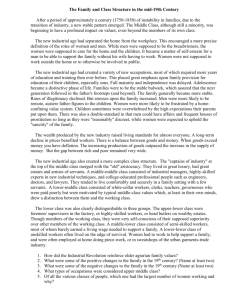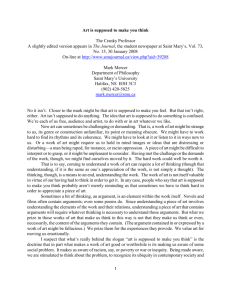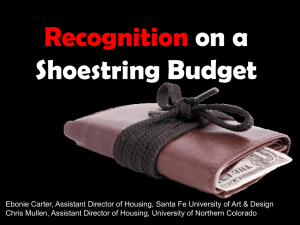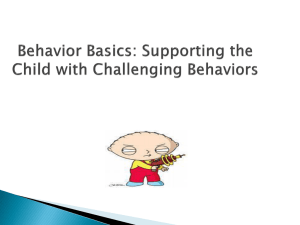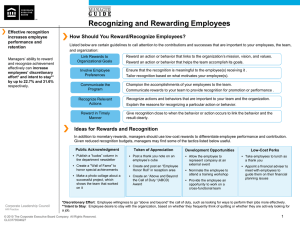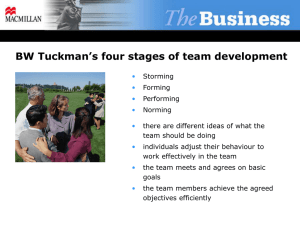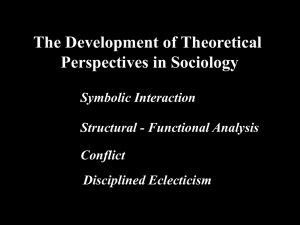Performance Management Workshop
advertisement
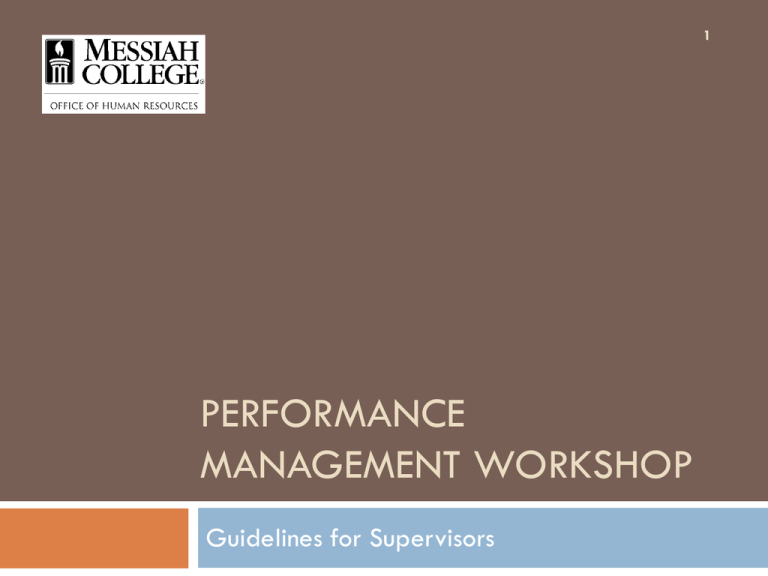
1 PERFORMANCE MANAGEMENT WORKSHOP Guidelines for Supervisors 2 Your ability as a manager is measured by what your employees do. ~Ferdinand F. Fournies, 2000. What is the function of a manager? 3 Getting things done through others May also include a technical component Managing the work behaviors of your employees Behaviors can be observed, measured, recorded Avoid blaming poor performance on attitude Presumes you know what employee is thinking Takes you out of the equation How do you manage the work behaviors of your employees? 4 Planning Organizing Directing Coordinating Controlling Coaching Motivators for high-level performance: Achievement Recognition Why don’t employees do what they’re supposed to do? 5 Why don’t employees do what they’re supposed to do? 6 They don’t know what they’re supposed to do They don’t know how to do it They don’t know why they should do it They think they are doing it Lack of direction Lack of communication Employees don’t know what they’re supposed to do. 7 Expectations are not specific When to begin When to end What finished is supposed to look like Priorities are not stated Changes to expectations and/or priorities are not communicated Employees don’t know how to do it. 8 Training is non-existent or inadequate. Opportunity to practice is not provided. Lack of readiness testing. Employees don’t know why to do it. 9 Sharing ‘big picture’ with your employees: Gives sense of purpose to work First line employee is closest to the process; facilitates informed decision-making Part of understanding and having expertise is being aware of larger picture Promotes sense of community Gives employee the security to handle constructive criticism Employees think they’re doing it. 10 Does your employee know what finished is supposed to look like? Is there a yardstick for self-feedback? Are you providing appropriate feedback? Positive Feedback & Praise 11 The best performance review is the capstone of a year’s worth of conversation. Nothing 12 Behavior is a function of its consequences. ~ Ferdinand Fournies, 2000 Informal Praise 13 Acknowledge Success Explain specific work or improvement how something that the employee did made a tangible difference to you or to the dept. Recognize the employee’s work in front of others Give credit for work abundantly Recognize when a project is conference/publish worthy – make such a recommendation Formal Praise 14 Remember to note especially fine work in the year-end evaluations. Take the employee to lunch after completing an especially important project or piece of work. Schedule skip level lunches so that the employee has the opportunity to discuss work with your boss Nominate the employee for the Pride in Performance or President’s Awards Constructive Criticism 15 The less feedback (praise or constructive criticism) that you provide throughout the year, the less prepared your employees will be to receive feedback. Not addressing a problem behavior is the same thing as saying that the behavior is OK. Only address those behaviors that are truly important to you and will make a difference in productivity or work environment. Step 1: Address Specific Behavior 16 “You are not completing some of your work as thoroughly as necessary.” Step 2: Provide A Concrete Example 17 “For example, yesterday, when you returned from loading the material, you did not log any of the afternoon’s entries.” Step 3: Illustrate Why It’s A Problem 18 “Because you did not log the afternoon’s entries, I was not able to complete the budget report in a timely fashion.” Step 4: Allow the Employee to Respond 19 “Help me understand what happened.” or “What can I do to better explain the process?” or “Let’s take a chance to review expectations.” Step 5: Establish the Follow Up 20 Behavior – “It is important to consistently log all entries each afternoon before you leave. If you cannot finish the afternoon entries, you need to tell me as soon as you realize the problem.” Consequence – “I am happy to help you if I know in advance, but not telling me and then leaving is problematic. If that happens again, I’ll need to address the matter in a formal write-up.” Give the Conversation Flexibility 21 “Do you know that…” or “Are you aware that…..” or “I’m sensing that I may not have been clear on….” Avoid Exaggeration 22 “You always...” or “You never…” or “Every time….” or “We are constantly having to…..” Reduce Personal Defensiveness 23 “It’s important to me that you are successful, so I need to tell you that….” or “In order to take your professional excellence to the next level, you will need to …..” or “You have focused effectively on A and B. Going forward, I need you to focus on D equally as much.” or “You are focusing on A, but you really need to focus on B.” Deal with Work Behavior 24 Avoid the Personal You don’t seem to care about work. You don’t mind if you keep people waiting. You are irresponsible. Focus on Work You have no work ethic. You have a bad attitude. You finish your work quickly, but it often has to be re-done People often have to wait because you are consistently 10 minutes late. You miss meetings on a regular basis, most recently on 6/1. Your personal phone calls are excessive and need to be limited to 1-2 very brief calls per day unless there is an emergency. Formal Performance Review Process 25 90 Day Review Performance conversation at end of probationary period New Hires Transfers Fit with Position Fit with Messiah Potential for future success in role Send review form to Human Resources Performance Appraisal 26 What is it? Annual review Self-evaluation component Supervisor assessment Why do we do it? Capstone of ongoing performance conversation Employees who understand your expectations and where they stand are more engaged, productive Not tied to compensation change Maintained in employee personnel file in Human Resources Planning for a successful appraisal 27 Maintain log throughout the year Points of excellence Points of concern Gather feedback Partnering departments Employee’s customers Schedule uninterrupted time for review Appraisal formats 28 Standard forms available on HR website Staff Admin Customized template Job Knowledge, Work Quality & Management of assigned duties Employee Relations & Teamwork Customer Service & Responsiveness Planning & Organization Judgment & Decision Making What is included in an effective appraisal? 29 Discuss job assignment Discuss work environment Re-affirm employee contributions Provide specific examples of successes Address areas for improvement Provide specific examples of weaknesses Be Sure to Avoid 30 Do not focus on one specific event or incident – review the entire year. Do not go by your memory alone. Length of service does not automatically mean better performance. Do not overrate under performers as a motivational tool. Do not avoid the truth. Do not rush the performance review meeting. Available Resources 31 On the website… Manager’s performance log Guide for addressing problem behavior Works Cited 32 Fournies, Ferdinand. Coaching: for improved work performance. New York, New York: McGraw- Hill Publishing, 2000.
